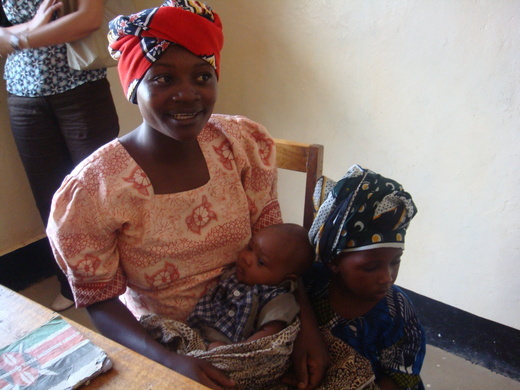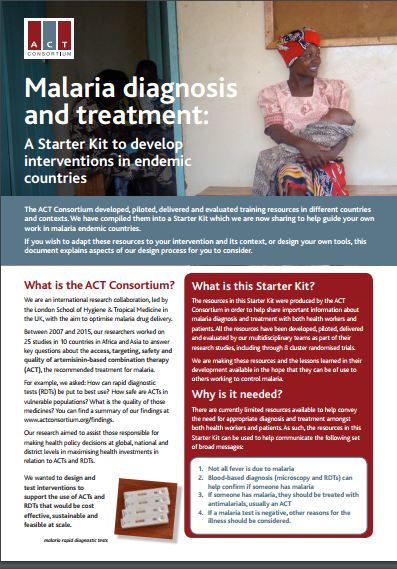Malaria researchers launch free kit to develop diagnosis and treatment interventions
25 April 2016

The malaria community can now use a Starter Kit to develop diagnosis and treatment interventions in endemic countries. ACT Consortium researchers launched the five resources on World Malaria Day as well as guidance to adapt them to local contexts.
The ACT Consortium developed, piloted, delivered and evaluated training resources in different countries and contexts, including 8 randomised trials. These are now compiled them into a Starter Kit which is now available to help guide those working in malaria endemic countries.
Download: Malaria diagnosis and treatment starter kit to develop interventions in endemic countries
 There are currently limited resources available to help convey the need for appropriate diagnosis and treatment amongst both health workers and patients.
There are currently limited resources available to help convey the need for appropriate diagnosis and treatment amongst both health workers and patients.
The resources in this Starter Kit can be used to help communicate the following set of broad messages:
- Not all fever is due to malaria
- Blood-based diagnosis (microscopy and RDTs) can help confirm if someone has malaria
- If someone has malaria, they should be treated with antimalarials, usually an ACT
- If a malaria test is negative, other reasons for the illness should be considered.
If you wish to adapt these resources to your intervention and its context, or design your own tools, this overview document explains aspects of our design process for you to consider.
- Resource 1: Health centre staff trainer and learner manuals (PRIME study, Uganda)
- Resource 2: Health worker training manuals and card game (REACT study, Cameroon)
- Resource 3: Drug shop vendor training manuals and job aids (Uganda study)
- Resource 4: Community Health Worker training and job aids (Uganda study)
- Resource 5: Health worker trainer and trainee manuals and patient leaflet (TACT study, Tanzania)
The Starter Kit was launched during a World Malaria Day event at the London School of Hygiene & Tropical Medicine.
Watch the event
https://panopto.lshtm.ac.uk/Panopto/Pages/Viewer.aspx?id=e1a8ca32-effc-44fc-b513-a148b0d9361b
Event presentations
- Answering key questions on malaria drug delivery: 8 years of research
David Schellenberg
Director, ACT Consortium
Professor of Malaria & International Health at London School of Hygiene & Tropical Medicine, UK
- Listening to your audience: qualitative research in malaria interventions
Clare Chandler
Lead Society Scientist, ACT Consortium
Senior Lecturer in Medical Anthropology at London School of Hygiene & Tropical Medicine, UK
- TACT: a trial of interventions to improve the use of malaria RDTs
Hugh Reyburn
Principal Investigator, ACT Consortium study in Tanzania
London School of Hygiene & Tropical Medicine, UK
- Improving malaria diagnosis and treatment in the private retail sector in Uganda
Anthony Mbonye
Principal Investigator, ACT Consortium study in Uganda
Ministry of Health, Uganda
- Interventions to change providers' practice in Cameroon
Heidi Hopkins*
Cross-cutting analysis Lead, ACT Consortium
Senior Lecturer in Malaria & Diagnostics at London School of Hygiene & Tropical Medicine, UK
*on behalf of REACT Team in Cameroon
Further information
- Follow the discussion online at #ACTdiagnosis
- Little attention paid to how health interventions are designed (News)

